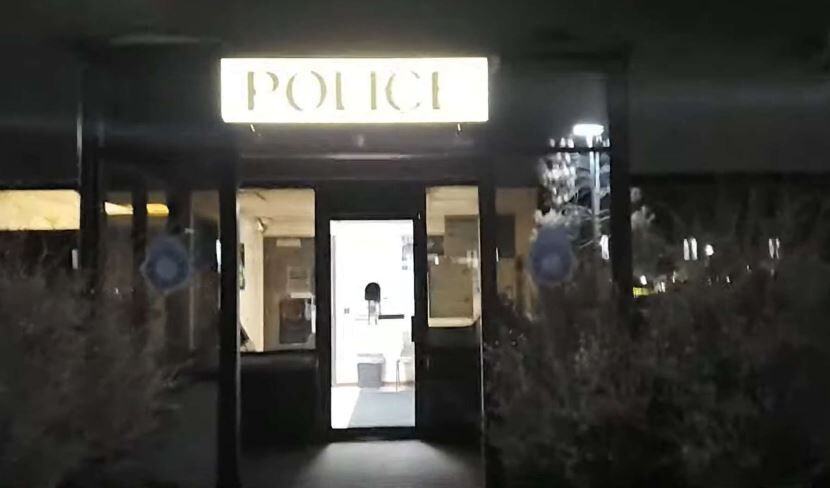Judge denies immunity to Denver officers in right-to-record suit

A man has plausibly claimed Denver police officers arrested him without probable cause of a crime and instead in retaliation for exercising his First Amendment right to record them, a federal judge has ruled.
U.S. District Court Chief Judge Philip A. Brimmer rejected the city’s motion to dismiss the lawsuit of Kevin Detreville, who was recording with his cell phone inside the vestibule of the District 5 station in northeast Denver immediately prior to his arrest. The lawsuit and accompanying video suggested Detreville was not recording “in” the station, as nearby signage prohibited, but officers arrested him anyway.
“The Court further finds that a reasonable officer would not interpret the plain language of the sign to prohibit what plaintiff was doing, namely, recording outside of the Station door in a way that captured images of the inside of the Station,” Brimmer wrote in a Dec. 14 order.
Officers Sergey Gurevich and Julie Weinheimer claimed they were entitled to qualified immunity in the litigation, which shields government employees from civil liability unless they violate a person’s clearly-established legal rights. As of November 2019, when they encountered Detreville filming inside the vestibule, there was no precedent-setting court decision for Colorado clearly establishing that the First Amendment guarantees the right to record police officers in public.
However, that changed this year, when the U.S. Court of Appeals for the 10th Circuit acknowledged for the first time the existence of a right to record and, further, deemed the right was clear at least as early as May 2019. The appellate court’s decision effectively doomed the Denver officers’ defense to Detreville’s First Amendment allegations.
Detreville is one of several cop watchers in the Denver area who performs “First Amendment audits” by video recording officers.
“I consider myself a sparring partner to the police,” he told CBS4 last year.
The night of Nov. 10, 2019, as depicted on his cell phone footage, Detreville arrived at the District 5 station along Peoria St. The complex houses other government offices for Denver in addition to police.
“What I’m doing is perfectly legal, y’all. These are my vehicles. They’re your vehicles,” Detreville said as he recorded police cars parked outside. After walking around, he said he was going to see if police would respect his First Amendment right to record.
“All right, we’re gonna head inside now,” Detreville said.
He continued from the sidewalk to a walkway leading up to the station. Outside of the reception area was an enclosed vestibule. As Detreville entered the vestibule, but before he reached the reception area, Weinheimer opened the door and stood in the entryway.
“Can I help you?” she asked. Detreville responded that he wanted to locate the “accommodation” and complaint forms. Weinheimer informed him that no physical forms existed, but there was a phone number he could call.
“What’s your name and badge number?” Detreville asked her. Weinheimer handed him her card. She asked if she could help Detreville with anything, and he repeated his demand for her name and badge number.
“Yes, I literally just handed you my card,” Weinheimer responded. “I walked out the door, you put a camera in my face, I’m asking how I can help you.”
Gurevich then arrived, informing Detreville that recording was not allowed “on our property. If you don’t stop recording, we’ll have to arrest you.” Weinheimer pointed to a sign in the vestibule, affixed to the reception area’s window, that read, “No video recording allowed in the Denver District 5 Station without prior permission from the Chief of Police.”
Gurevich gave Detreville a “second warning” to stop recording, to which Detreville replied that recording was his First Amendment right.
“OK, it’s not, actually,” Weinheimer said, placing him in handcuffs. The officers took him inside to be booked. Detreville declined to give his identity, and Gurevich cautioned him that he would be booked as a “John Doe” and would be in jail longer while his fingerprints were verified.
“Now that you’re aware of that information, do you wish to give me your name?” Gurevich asked. Detreville refused.
According to Detreville’s lawsuit, he was in jail for three days, a duration that his lawyers said was unrelated to Detreville’s failure to provide his name. Prosecutors ultimately dismissed the charge against him of unlawful conduct on public property.
Detreville filed suit in March 2021 alleging a violation of his Fourth Amendment right against unreasonable searches and seizures, arguing the officers did not have probable cause of a crime to arrest him. He also alleged a First Amendment violation and an infringement on his right to equal protection under the law. For the latter claim, he asserted that, as a Black man, Gurevich and Weinheimer chose to arrest him for recording, but did not do the same with two white cop watchers who visited the District 5 station in subsequent days – in response to Detreville’s arrest – and recorded in the same vestibule.
The city asked Brimmer to dismiss the lawsuit. It claimed the officers acted reasonably by not permitting Detreville to record the inside of the police station, which could implicate the privacy of crime victims, confidential informants or suspects.
“Plaintiff may have been violating the posted regulation barring recording ‘in’ the station by recording ‘in’ the enclosed entryway/vestibule, which was a part of the station distinct from the sidewalk outside of it,” wrote Assistant City Attorney Katherine Field.
Brimmer flatly rejected that interpretation. The sign posted in the vestibule applied to video recording “in” the station, and Detreville’s footage showed he never went past the sign into the station, except when arrested. Therefore, the officers had no probable cause of a crime.
Because Detreville had alleged Gurevich and Weinheimer were on duty at the station when two white people stood in the same spot to record, without arresting them, Brimmer also found Detreville could proceed on his equal protection claim.
Detreville is seeking monetary damages from the defendants.
The case is Detreville v. Gurevich et al.
Editor’s note: This story has been updated to correct the details of Detreville’s detention in jail.













